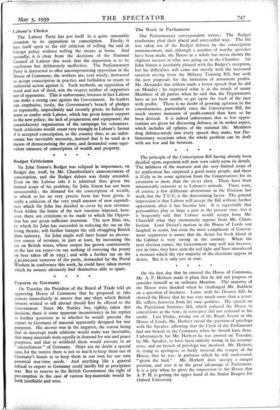Labour's Choice The Labour Party has put itself in a
quite untenable situation in its opposition to conscription. Firstly, it lays itself open to the old criticism of willing the end in foreign policy without willing the means at home. And secondly, it is clear from the decisions of the National Council of Labour this week that the opposition is to be vociferous but deliberately ineffective. The Parliamentary Party is instructed to offer uncompromising opposition in the House of Commons; the workers are, very wisely, instructed to accept conscription in practice and forbidden to resort to industrial action against it. Such methods, an opposition of word and not of deed, win the respect neither of supporters nor of opponents. This is unfortunate, because in fact Labour can make a strong case against the Government. Its leaders can emphasise, justly, the Government's breach of pledges so repeatedly, imprudently and recently given; its failure to warn or confer with Labour, which has given honest support to the new policy; the lack of preparation and equipment; the unsatisfactory organisation of the campaign for volunteers. Such criticisms would count very strongly in Labour's favour if it accepted conscription, as the country does, as an unfor- tunate but inevitable necessity, insisted that it be used as a means of democratising the army, and demanded some equi- valent measure of conscription of wealth and property.
* * * *














































 Previous page
Previous page